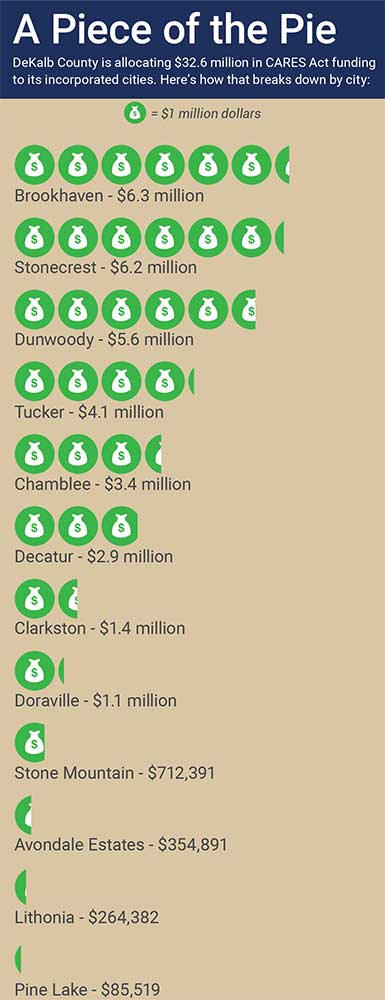InTucker Magazine
November 2020
From the Mayor – November 2020

I’ve written at length in this space before about government’s limitations. We have a continual need for participation by individual citizens, community groups, churches, and others to make things work for all of us, because one thing government is not capable of is loving its neighbor. We’re in the midst of a time of great need, and many selfless folks in Tucker are doing their part to help.
One thing government can do is spend money. And one way it’s doing that on a large scale right now is through the CARES Act.
As a large local government (500,000+ population), DeKalb County received a little over $126 million at the end of April, intended for relief for DeKalb’s residents. They took a while deciding how to spend it, and even longer to decide to allow the cities in DeKalb to spend some at their own discretion within their cities. In September, we finally reached an agreement that awarded a little over $4.1 million to Tucker for coronavirus relief, which we received near the end of the month. The Coronavirus Aid, Relief, and Economic Security (CARES) Act passed the House and Senate this spring and was signed into law by President Trump on March 27. CARES is a $2 trillion stimulus package designed to bolster the economy by supporting everyday Americans, including the businesses and other organizations through which they earn their livelihoods. There were a number of different aspects to the distribution of that $2,000,000,000,000. About $300 billion was allocated for cash payments to individuals and families. Chances are you saw a check show up in your mailbox back in April or May. Another chunk, around $500 billion, went toward aid for large corporations. Nearly $700 billion went toward forgivable small business loans under the Payroll Protection Program. And finally, just shy of $350 billion was distributed to state and local governments.
While we had been planning how to most effectively spend the money, we didn’t know if or when we would receive it. Neither did we know how much we might have to work with, and we certainly couldn’t know what would be the greatest needs at the time we actually received it.
The good news is that Tucker worked hard and quickly once the money was on its way, and despite the challenges, the money is already getting into the hands of those who need it. We’re sprinting to put the money to work in our community. Part of that comes from the desire to help those in need as quickly as possible. Part of it is driven by the December 20 deadline to get it spent. That’s right – every penny we don’t spend on qualified expenses by December has to be returned, and I have no intention of letting that happen. Whatever your situation, I want to make sure you know exactly where the money is going and, if you find yourself in need, how you can apply for help.

The largest piece of our $4.1 million allotment will go toward a small business grant program. The application window is now closed, but we received over 100 applications last month from businesses of all types. As a small business owner myself, I believe this piece will be critically important to getting our city through a tough time. The grants aren’t huge – $5,000, $10,000 or $15,000 – but for a restaurant trying to make rent or a childcare center that needs to purchase PPE, these grants can mean the difference between staying open or shutting down. And for the people who work there, it can be the difference between paying for food, utilities and medicine, or going without.
In addition to keeping people employed and businesses operating, we want to help our citizens who cannot earn a living due to the pandemic to meet their basic needs. In many cases, that means simply helping them stay in their homes. We allocated about $900,000 toward helping residents in need, including rent and mortgage assistance. It can also go toward help paying their utilities or affording a trip to the grocery store. There’s not enough money in the world to address every need, but we do have funds to help a lot of folks through this most difficult financial time.
In the same vein of government’s limitations, we know government can’t do everything all by itself, or be an expert in every field. We just can’t. We know the community, but we don’t have the expertise to run programs like these as well as those who are on the ground and in the trenches every day. So, we did something smart; we partnered with David Fisher and his team at NETWorks Cooperative Ministries. For years, David, his staff, and his volunteers have kept food and assistance going to those in need across Tucker and surrounding areas. When we needed an efficient way to get these resources out in a very limited period of time, we knew we needed NETWorks as a partner. To date, they have helped us with processing more than 100 applications for assistance. Those are your friends, your neighbors, the family you go to church with. Because of the federal assistance and the work of NETWorks, those folks may have food to eat and gas to heat their homes this winter.
We did something similar, hiring Local Initiative Support Corporation (LISC ) to administer the business grants program. They are the nationally recognized leader in this field, and are well-equipped to be sure the money is granted properly, effectively, and objectively to those who qualify.
Another facet of Tucker’s program is virtual learning, and it’s another example of partnering with those best equipped to respond. Tucker is fortunate that the faith community stepped up and offered students a place to go with schools closed for the pandemic. Well before we received the CARES Act money, Rehoboth Baptist Church and St. Andrew’s Presbyterian had set aside space and resources to welcome students to a safe learning environment with internet connectivity and the other resources necessary to continue learning while away from the school building. But their generosity came at a cost. As you’ll read on page 12, these churches had to retrofit classrooms to allow students and teachers the ability to remain socially distant as they learned. I am proud of their efforts to help working parents by giving them a place to send their children, and I am glad the City is reimbursing them for some of the expenses they incurred, so they can continue to provide this valuable service well into next year.
Lastly, the City has incurred expenses throughout the pandemic, and we will reimburse ourselves for those expenses. That will help us continue to respond in the future without having to add an extra tax burden to our citizens and businesses. Some of those expenses you’ll never see directly. We installed a Global Plasma System inside Tucker Recreation Center. It sounds fancy and it is. This system ionizes the air, making particles in the air that could carry COVID too heavy to float so they fall to the ground. We purchased Plexiglas partitions for many of the desks inside City Hall. And, as you hopefully know by now, we distributed around 40,000 masks to residents and businesses all over Tucker. I’m proud of these efforts and, in lean fiscal times, I’m glad that we will be reimbursed for those expenses.
I point all this out because your government should be transparent with your money. To track money from the federal level to state to county and down to city can be daunting. Rest assured, this $4.1 million is being put to good use. If you know of a neighbor who is in need right now, there are still resources for them. Have them visit www.tuckerga.gov/CARESAct.


